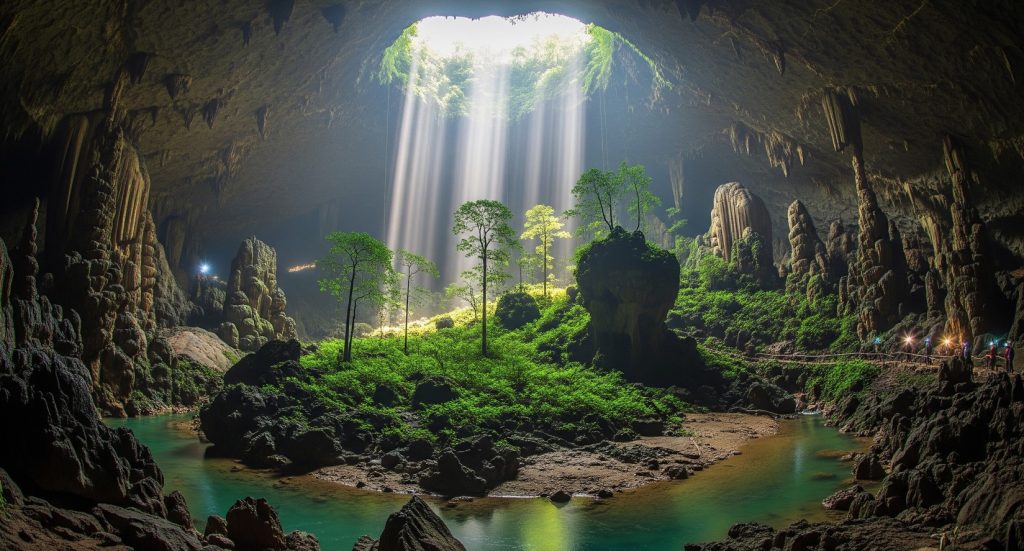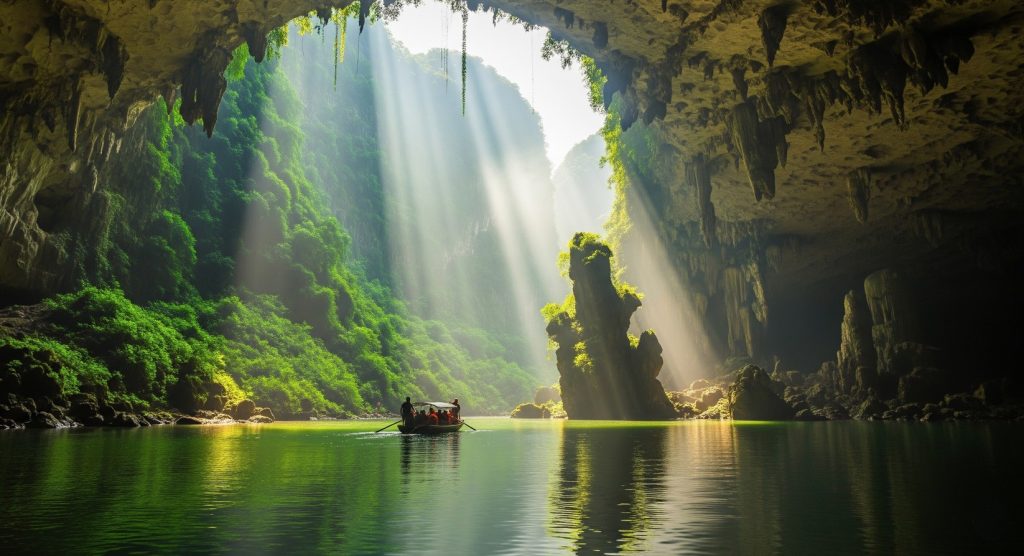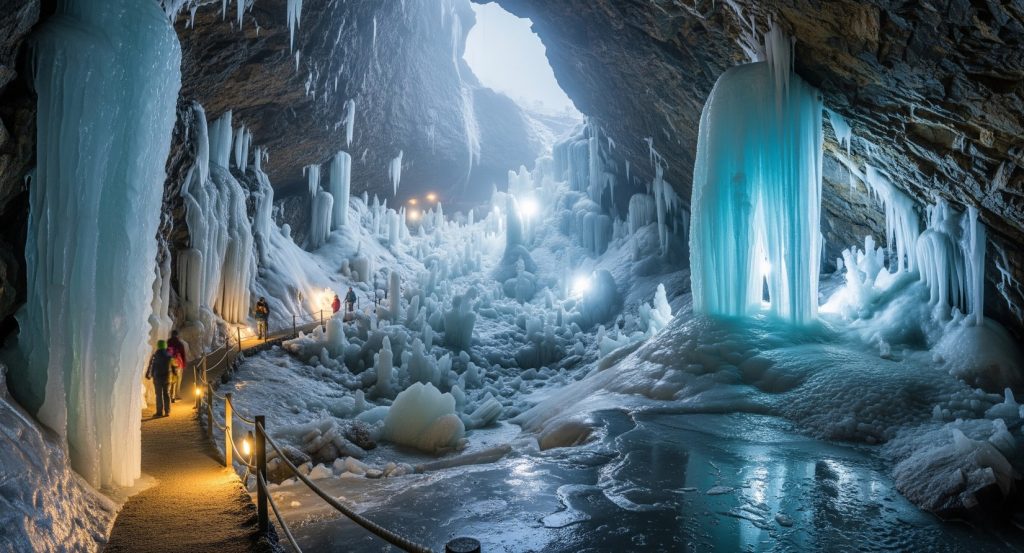For thrill-seekers and nature lovers alike, few experiences rival the thrill of descending into the earth’s hidden realms. From glowing subterranean lakes to ice sculptures and soaring underground canyons, caves offer a window into geological wonders that have taken millennia to form. In this guide, we’ll journey through eight of the world’s most extraordinary caves, share essential planning tips, and inspire you to add these epic underground adventures to your bucket list.
1. Waitomo Glowworm Caves, New Zealand
Nestled on New Zealand’s North Island, the Waitomo Glowworm Caves are famed for their ethereal bioluminescent displays. Guided boat tours drift silently beneath thousands of Arachnocampa luminosa glowworms, whose tiny lights mirror a starlit sky overhead. Beyond the glowworm grotto, you can venture on adventurous black-water rafting trips—wading, floating, and occasionally rappelling in narrow limestone passages.
Best Time to Visit: November to April for warmer water temperatures and longer daylight hours. What to Pack: Waterproof flashlight, quick-dry clothing, sturdy water shoes, and a waterproof bag for electronics.
2. Sơn Đoòng (Son Doong) Cave, Vietnam
Renowned as the world’s largest cave passage, Sơn Đoòng plunges deep into Vietnam’s Phong Nha–Kẻ Bàng National Park. Discovered in 1991 and opened to select expeditions in 2013, it features its own localized weather system, colossal stalagmites, and subterranean jungles thriving under skylights where collapsed ceilings allow sunlight to filter in.
This multi-day expedition demands physical fitness, as trekkers hike through dense jungle, cross underground rivers, and camp beneath mammoth chamber roofs. Each trip is limited to 10 people, ensuring an intimate encounter with one of Earth’s greatest natural cathedrals.

3. Deer Cave, Malaysia
Located in Gunung Mulu National Park on Borneo, Deer Cave is famous for housing the world’s largest single cave passage. At dusk, millions of bats swirl out of the cave mouth in spectacular aerial formations, creating a living dark curtain against the twilight sky.
Interior exploration reveals soaring ceilings—more than 100 meters high—and intricate limestone formations. Nightly bat exoduses are best viewed from the designated platform just outside the entrance, while daytime guided walks introduce the cave’s geology and ecology.
4. Phong Nha Cave, Vietnam
Also in Phong Nha–Kẻ Bàng National Park, Phong Nha Cave is celebrated for its underground river, which you traverse by small boat. Inside, towering limestone columns, fragile moonmilk formations, and subterranean waterfalls create a mystical setting only accessible via water.
Several tour options range from a single river cruise to full-day adventures combining mountain bike rides and trekking to nearby caves like Tien Son. Keep an eye out for hidden grottoes and narrow side passages that reveal nature’s sculptural artistry.

5. Škocjan Caves, Slovenia
A UNESCO World Heritage Site, the Škocjan Caves form one of Europe’s largest underground canyons. The Reka River thunders through massive chambers, carving deep gorges and creating dramatic waterfalls before vanishing into the subterranean labyrinth.
Guided tours traverse hanging bridges, walkways, and illuminated pathways that showcase colossal stalactites and cascading streams. In summer, special “adventure” excursions allow you to kayak part of the underground river under expert supervision.
6. Blue Grotto, Capri, Italy
For a cave flooded with sky-blue light, the Blue Grotto on Italy’s Isle of Capri delivers an otherworldly spectacle. Sunlight passes through an underwater cavity and reflects off the white seabed, bathing the cavern in intense cerulean hues.
Access is via traditional rowboats that slip through a small opening at high tide. Inside, visitors marvel at the luminous walls and antique Roman statues that lie on the cavern floor—a relic of Emperor Tiberius’s seafaring villa above.
7. Kartchner Caverns, Arizona, USA
Hidden for thousands of years and discovered only in 1974, Kartchner Caverns is a pristine example of living limestone formations. Located near Benson, Arizona, this state park preserves an array of delicate soda straws, draperies, and flowstones still growing today.
Temperature and humidity are strictly regulated, and tours depart year-round. The Throne Room and Kubla Khan are must-see chambers, illuminated to reveal golden-hued stalactites and walls encrusted with crystalline formations.
8. Eisriesenwelt Ice Cave, Austria
Just south of Salzburg, Eisriesenwelt is the largest ice cave on Earth, extending more than 42 kilometers into the Tennengebirge Mountains. During the cold months, you wander past glistening ice sculptures, frozen waterfalls, and towering ice columns illuminated by strategic lighting installations.
Tours run from May to October—when interior ice remains stable—and involve a steep cable-car ride plus a guided 1.5 km walk to the ice formations. Dress in layers: temperatures average around 0 °C inside the cave entrance.

Tips for Safe and Responsible Cave Exploration
Underground adventures can be profoundly rewarding, but they also carry unique risks. Follow these guidelines to ensure a safe, eco-friendly journey:
- Book Certified Guides: Always explore with licensed caving guides who know the routes, hazards, and wildlife considerations.
- Check Conditions: Confirm seasonal closures, water levels, and weather forecasts. Sudden rain can flood passages without warning.
- Pack Light, Pack Right: Carry essentials only: headlamp with spare batteries, helmet, water, snacks, first-aid kit, and a whistle. Avoid single-use plastics.
- Leave No Trace: Do not touch formations or disturb wildlife. Caves are fragile ecosystems where oils from human skin can halt mineral growth.
- Mind Your Footing: Wet rocks are slippery. Wear non-slip footwear and move slowly. Use handrails when provided.
- Communicate Plans: Share your itinerary with someone above ground and establish check-in times.
Conclusion
From the bioluminescent enchantment of Waitomo to the frozen grandeur of Austria’s Eisriesenwelt, cave exploration offers a blend of awe, adventure, and scientific intrigue. Whether you seek heart-pounding rappels, serene underground boat cruises, or the chance to witness nature’s slow artistry firsthand, these eight cave expeditions deliver unforgettable memories. Plan carefully, respect subterranean ecosystems, and prepare to be humbled by the silent power of Earth’s hidden underworld.











